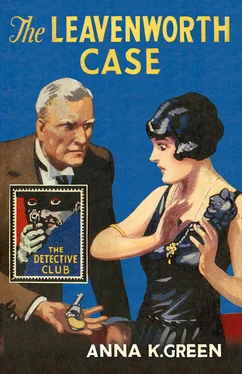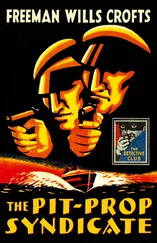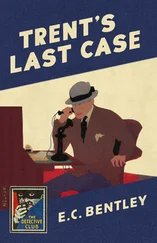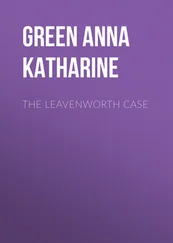‘I don’t know,’ he finally remarked, a slight frown, testifying to the fact that he was not altogether pleased with the turn affairs were taking. ‘Perhaps it would be best. The ladies must not be left alone—’
‘Say no more; I will go.’ And, sitting down, I despatched a hurried message to Mr Veeley, after which, and the few other preparations necessary, I accompanied the secretary to the street.
‘Now,’ said I, ‘tell me all you know of this frightful affair.’
‘All I know? A few words will do that. I left him last night sitting as usual at his library table, and found him this morning, seated in the same place, almost in the same position, but with a bullet-hole in his head as large as the end of my little finger.’
‘Dead?’
‘Stone-dead.’
‘Horrible!’ I exclaimed. Then, after a moment, ‘Could it have been a suicide?’
‘No. The pistol with which the deed was committed is not to be found.’
‘But if it was a murder, there must have been some motive. Mr Leavenworth was too benevolent a man to have enemies, and if robbery was intended—’
‘There was no robbery. There is nothing missing,’ he again interrupted. ‘The whole affair is a mystery.’
‘A mystery?’
‘An utter mystery.’
Turning, I looked at my informant curiously. The inmate of a house in which a mysterious murder had occurred was rather an interesting object. But the good-featured and yet totally unimpressive countenance of the man beside me offered but little basis for even the wildest imagination to work upon, and, glancing almost immediately away, I asked:
‘Are the ladies very much overcome?’
He took at least a half-dozen steps before replying.
‘It would be unnatural if they were not.’ And whether it was the expression of his face at the time, or the nature of the reply itself, I felt that in speaking of these ladies to this uninteresting, self-possessed secretary of the late Mr Leavenworth, I was somehow treading upon dangerous ground. As I had heard they were very accomplished women, I was not altogether pleased at this discovery. It was, therefore, with a certain consciousness of relief I saw a Fifth Avenue stage approach.
‘We will defer our conversation,’ said I. ‘Here’s the stage.’
But, once seated within it, we soon discovered that all intercourse upon such a subject was impossible. Employing the time, therefore, in running over in my mind what I knew of Mr Leavenworth, I found that my knowledge was limited to the bare fact of his being a retired merchant of great wealth and fine social position who, in default of possessing children of his own, had taken into his home two nieces, one of whom had already been declared his heiress. To be sure, I had heard Mr Veeley speak of his eccentricities, giving as an instance this very fact of his making a will in favour of one niece to the utter exclusion of the other; but of his habits of life and connection with the world at large, I knew little or nothing.
There was a great crowd in front of the house when we arrived there, and I had barely time to observe that it was a corner dwelling of unusual depth when I was seized by the throng and carried quite to the foot of the broad stone steps. Extricating myself, though with some difficulty, owing to the importunities of a boot-black and butcher-boy, who seemed to think that by clinging to my arms they might succeed in smuggling themselves into the house, I mounted the steps and, finding the secretary, by some unaccountable good fortune, close to my side, hurriedly rang the bell. Immediately the door opened, and a face I recognised as that of one of our city detectives appeared in the gap.
‘Mr Gryce!’ I exclaimed.
‘The same,’ he replied. ‘Come in, Mr Raymond.’ And drawing us quietly into the house, he shut the door with a grim smile on the disappointed crowd without. ‘I trust you are not surprised to see me here,’ said he, holding out his hand, with a side glance at my companion.
‘No,’ I returned. Then, with a vague idea that I ought to introduce the young man at my side, continued: ‘This is Mr—, Mr—, excuse me, but I do not know your name,’ I said inquiringly to my companion. ‘The private secretary of the late Mr Leavenworth,’ I hastened to add.
‘Oh,’ he returned, ‘the secretary! The coroner has been asking for you, sir.’
‘The coroner is here, then?’
‘Yes; the jury have just gone upstairs to view the body; would you like to follow them?’
‘No, it is not necessary. I have merely come in the hope of being of some assistance to the young ladies. Mr Veeley is away.’
‘And you thought the opportunity too good to be lost,’ he went on; ‘just so. Still, now that you are here, and as the case promises to be a marked one, I should think that, as a rising young lawyer, you would wish to make yourself acquainted with it in all its details. But follow your own judgment.’
I made an effort and overcame my repugnance. ‘I will go,’ said I.
‘Very well, then, follow me.’
But just as I set foot on the stairs I heard the jury descending, so, drawing back with Mr Gryce into a recess between the reception room and the parlour, I had time to remark:
‘The young man says it could not have been the work of a burglar.’
‘Indeed!’ fixing his eye on a door-knob nearby.
‘That nothing has been found missing—’
‘And that the fastenings to the house were all found secure this morning; just so.’
‘He did not tell me that. In that case’—and I shuddered—‘the murderer must have been in the house all night.’
Mr Gryce smiled darkly at the door-knob.
‘It has a dreadful look!’ I exclaimed.
Mr Gryce immediately frowned at the door-knob.
And here let me say that Mr Gryce, the detective, was not the thin, wiry individual with the piercing eye you are doubtless expecting to see. On the contrary, Mr Gryce was a portly, comfortable personage with an eye that never pierced, that did not even rest on you. If it rested anywhere, it was always on some insignificant object in the vicinity, some vase, inkstand, book, or button. These things he would seem to take into his confidence, make the repositories of his conclusions; but as for you—you might as well be the steeple on Trinity Church, for all connection you ever appeared to have with him or his thoughts. At present, then, Mr Gryce was, as I have already suggested, on intimate terms with the door-knob.
‘A dreadful look,’ I repeated.
His eye shifted to the button on my sleeve.
‘Come,’ he said, ‘the coast is clear at last.’
Leading the way, he mounted the stairs, but stopped on the upper landing. ‘Mr Raymond,’ said he, ‘I am not in the habit of talking much about the secrets of my profession, but in this case everything depends upon getting the right clue at the start. We have no common villainy to deal with here; genius has been at work. Now sometimes an absolutely uninitiated mind will intuitively catch at something which the most highly trained intellect will miss. If such a thing should occur, remember that I am your man. Don’t go round talking, but come to me. For this is going to be a great case, mind you, a great case. Now, come on.’
‘But the ladies?’
‘They are in the rooms above; in grief, of course, but tolerably composed for all that, I hear.’ And advancing to a door, he pushed it open and beckoned me in.
All was dark for a moment, but presently, my eyes becoming accustomed to the place, I saw that we were in the library.
‘It was here he was found,’ said he; ‘in this room and upon this very spot.’ And advancing, he laid his hand on the end of a large baize-covered table that, together with its attendant chairs, occupied the centre of the room. ‘You see for yourself that it is directly opposite this door,’ and, crossing the floor, he paused in front of the threshold of a narrow passageway, opening into a room beyond.
Читать дальше












